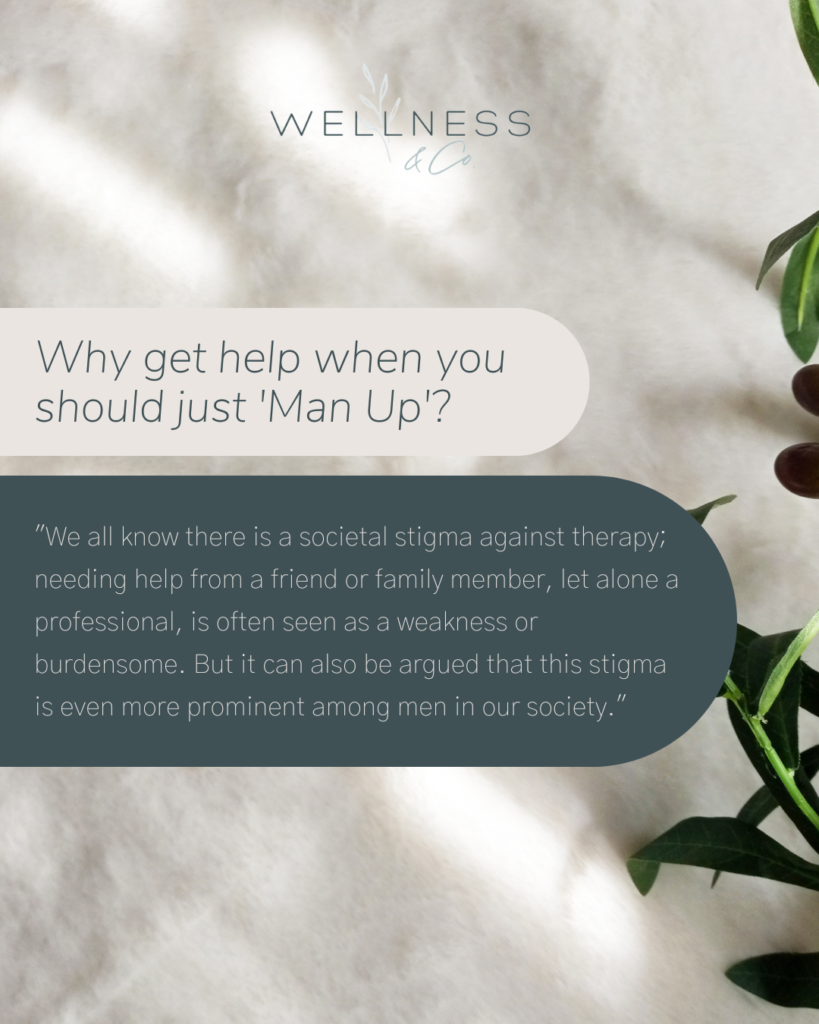Follow
Wellness & Co.
Hi, I'm Dr. K, Wellness & Co. is a growing therapy/coaching practice and educational hub for prospective clients based in Maryland and virtual clients all over the world!
Hi, I'm Dr. K
free guide
e -books
e -course
Why Get Help When You Should Just ‘Man Up’?
January 10, 2023
By Jessica Smith & Dylan Vanz

Alright, men- this one’s for you!
At Wellness & Co, we’ve received some feedback that we need to publish more blogs geared toward men. As such, this blog aims to tackle why it can be so hard for men to seek therapy, providing some useful insights from our very own Certified Life Coach and Enneagram Practitioner, Dylan Vanz! According to the American Psychological Association and the CDC, while women tend to experience higher rates of depression than men, the suicide rate among American men is about four times higher than among women. So, why aren’t these men getting the help they need?

We all know there is a societal stigma against therapy; needing help from a friend or family member, let alone a professional, is often seen as a weakness or burdensome. But it can also be argued that this stigma is even more prominent among men in our society. Starting from a young age, many boys are taught to “be tough” and to “man up” when facing difficulties. Showing sadness and crying are big no-nos. How does this then translate into resistance to asking for help when it’s needed?
I interviewed our very own Dylan to get a male’s perspective on the abovementioned stigma and to give him the opportunity to share about his own experience in therapy.
Q: What do you think deters men from seeking counseling/coaching?
A: At face value, men might say it’s finances or time constraints that deter them. Or, best of all, there is the age-old belief that men need to be “strong”. However, the truth of it is, we are scared s*itless of being vulnerable. Society tells us don’t do this – it’s weak. But from what I’ve learned doing this work, our entire system tells us don’t do this, it’s going to hurt too much. When we are thinking about going to therapy, we begin anticipating the pain that we will inevitably feel when exploring tough feelings. This makes us afraid, which actually makes us vulnerable, so to protect ourselves, we shut the idea of it down. The fear of fear itself stops us from moving forward.
Q: What is hard about participating in therapy as a man?
A: Fundamentally, participating in therapy is not necessarily more difficult for men than it is for women – women can experience just as much fear in facing vulnerability. From what I’ve seen, therapy is more difficult depending on one’s level of development, personality, worldview, and life experiences.
Q: What do you think makes it difficult for men to talk about their feelings?
A: Not to sound redundant, but, again, it is very uncomfortable facing that stinkin’ fear of vulnerability. I need to say that it’s not about doing this work to make vulnerability go away. Feelings don’t work that way. It’s more about changing our relationship with vulnerability. The more time we spend with our feelings and share our feelings, our system will start to create space for them rather than freaking out and trying to get rid of them. The more we normalize them, the less jolting they are to us.
Q: How did you know you needed therapy?
A: This question is a serious one for me and one of the reasons I switched from firefighting to becoming a Certified Life Coach and Enneagram Practitioner. I, like many other men, consciously and unconsciously avoided and suppressed my pain until my automatic coping skills could no longer hold it back. This is when our “stuff” gets out and can lead to us hurting those around us or ourselves in different ways like pushing away people we care about, emotional outbursts, isolating, self-harm, addiction, and suicide. For me, I experienced a PTSD episode, and a very kind chaplain at my fire station made me realize I can’t and don’t have to carry this pain alone.
Q: What have you enjoyed about therapy? What have you gained?
A: The thing I’ve enjoyed most is learning more about how I operate as a human being. Understanding my patterns and the million different ways my system uses them to protect me. So, what I have gained is the strength that came from being in a relationship with myself rather than being run by my fear-based system that thought I couldn’t handle it. When you aren’t constantly fighting fear, you discover a quiet ease in life.
We hope this has shed some light on what can make initiating therapy feel so difficult! Don’t get us wrong, therapy can involve some tough work, but it can be so rewarding. If you are a man who is struggling mentally or emotionally, it is not a sign of weakness to reach out for help. Rather, it is a sign of real strength! We’re hoping you can feel validated in learning more about Dylan’s perspective and journey, and the providers at Wellness & Co. want you to know we are 100% here for you!
Interested in getting started with one of our top-notch providers? Book a free consult here!
Jessica works with growth-minded individuals and couples motivated to deepen connections with themselves and in their relationships. She encourages her clients to consider new perspectives so they can gain insight and understanding while also exploring new tools for communication and coping.
Leave a Reply Cancel reply
CONTACT
Start Here
BLOG
OUR TEAM
SHOP
ABOUT
©2025 Wellness & Co. | All Rights Reserved | Design by EverMint Design Studio
BACK TO TOP
connect with us on instagram
